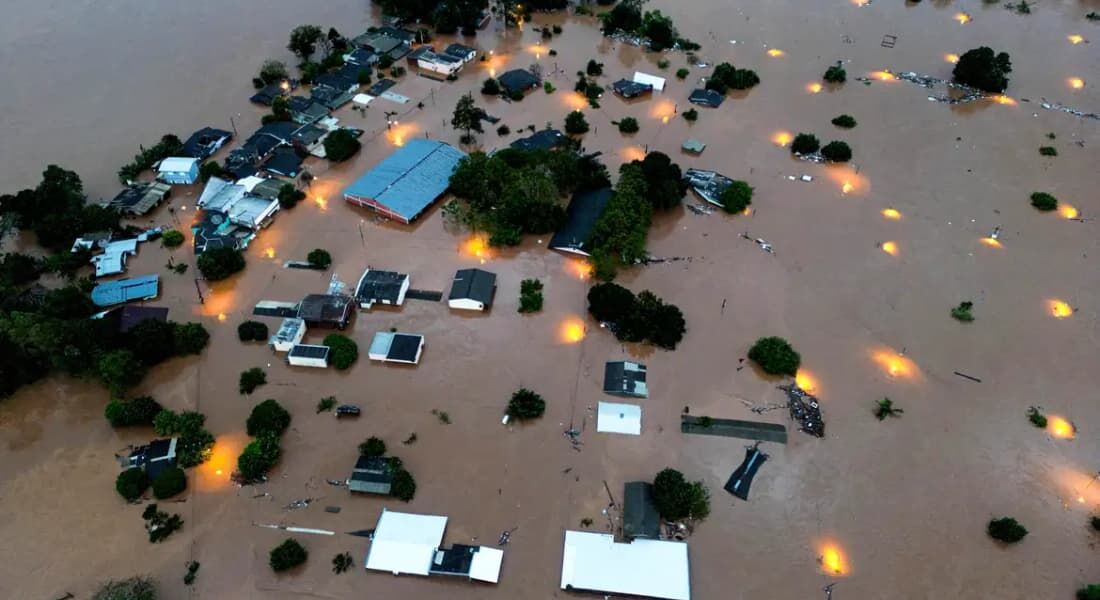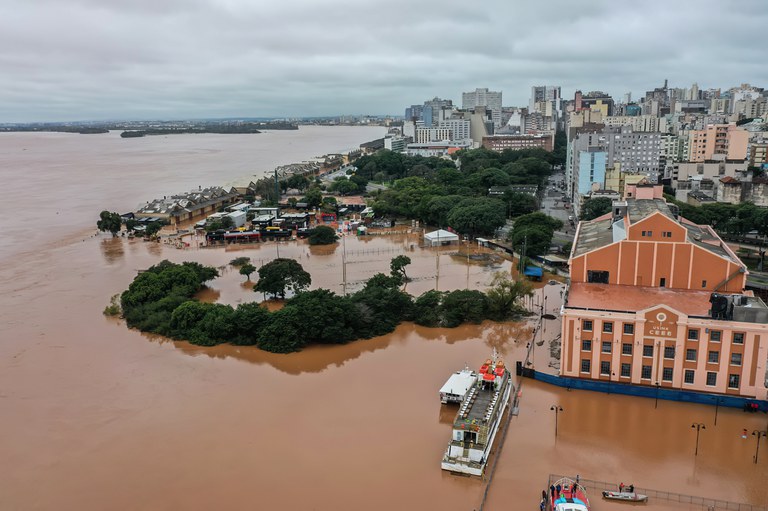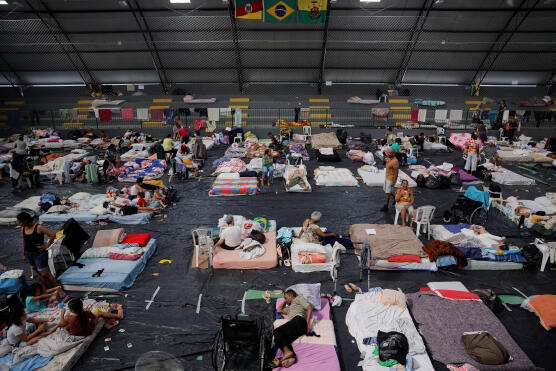- Joined
- Jan 17, 2010
- Messages
- 4,882
- Reaction score
- 5,977
More than 23,000 people forced to leave homes after heavy rains in southern Rio Grande do Sul prompt record-breaking floods

Heavy rains in the southern Brazilian state of Rio Grande do Sul have killed 37 people, with another 74 still missing, as record-breaking floods devastated cities and forced thousands to leave their homes.
It was the fourth such environmental disaster in a year, following floods in July, September and November that killed 75 people in total.
The flooding statewide has surpassed that seen during a historic 1941 deluge, according to the Brazilian Geological Service. In some cities, water levels were at their highest since records began nearly 150 years ago, the agency said.
On Thursday, a dam at a hydroelectric plant between the cities of Bento Goncalves and Cotipora partially collapsed and entire cities in the Taquari River valley, such as Lajeado and Estrela, were completely overtaken by water. In the town of Feliz, 50 miles (80km) from the state capital, Porto Alegre, a massively swollen river swept away a bridge that connected it with the neighboring city of Linha Nova.
Operators reported electricity, communications and water cuts across the state. More than 23,000 people had to leave their homes, according to the civil defense agency.
Without internet, telephone service or electricity, residents struggled to provide updates or information to their relatives living in other states. Helicopters flew continually over the cities while stranded families with children awaited rescue on rooftops.
The downpour started on Monday and is expected to last at least through Saturday, Marcelo Seluchi, chief meteorologist at the National Center for Monitoring and Alerts of Natural Disasters, told Brazil’s public television network on Friday.
On Thursday night, Governor Eduardo Leite alerted the state’s population, known as gauchos, about the persistence of rains and floods. The situation was expected to worsen in Porto Alegre, he said.
/i.s3.glbimg.com/v1/AUTH_da025474c0c44edd99332dddb09cabe8/internal_photos/bs/2023/m/C/4DndxoQzm4qZWYUgTsBg/enchentes-silvio-avila-afp-11.jpg)
“As a human being, I am devastated inside, just like every gaucho is,” he said. “But as governor, I am here steadfast and I guarantee that we will not falter. We are doing everything with focus, attention, discipline and outrage, to ensure that everything within our reach is done.”
Weather across South America is affected by the climate phenomenon El Niño, a periodic, naturally occurring event that warms surface waters in the equatorial Pacific region. In Brazil, El Niño has historically caused droughts in the north and intense rainfall in the south.
This year, the impacts of El Niño have been particularly dramatic, with a historic drought in the Amazon. Scientists say extreme weather is happening more frequently due to human-caused climate change.
https://www.theguardian.com/world/article/2024/may/03/brazil-floods-rio-grande-do-sul

Heavy rains in the southern Brazilian state of Rio Grande do Sul have killed 37 people, with another 74 still missing, as record-breaking floods devastated cities and forced thousands to leave their homes.
It was the fourth such environmental disaster in a year, following floods in July, September and November that killed 75 people in total.
The flooding statewide has surpassed that seen during a historic 1941 deluge, according to the Brazilian Geological Service. In some cities, water levels were at their highest since records began nearly 150 years ago, the agency said.
On Thursday, a dam at a hydroelectric plant between the cities of Bento Goncalves and Cotipora partially collapsed and entire cities in the Taquari River valley, such as Lajeado and Estrela, were completely overtaken by water. In the town of Feliz, 50 miles (80km) from the state capital, Porto Alegre, a massively swollen river swept away a bridge that connected it with the neighboring city of Linha Nova.
Operators reported electricity, communications and water cuts across the state. More than 23,000 people had to leave their homes, according to the civil defense agency.
Without internet, telephone service or electricity, residents struggled to provide updates or information to their relatives living in other states. Helicopters flew continually over the cities while stranded families with children awaited rescue on rooftops.
The downpour started on Monday and is expected to last at least through Saturday, Marcelo Seluchi, chief meteorologist at the National Center for Monitoring and Alerts of Natural Disasters, told Brazil’s public television network on Friday.
On Thursday night, Governor Eduardo Leite alerted the state’s population, known as gauchos, about the persistence of rains and floods. The situation was expected to worsen in Porto Alegre, he said.
/i.s3.glbimg.com/v1/AUTH_da025474c0c44edd99332dddb09cabe8/internal_photos/bs/2023/m/C/4DndxoQzm4qZWYUgTsBg/enchentes-silvio-avila-afp-11.jpg)
“As a human being, I am devastated inside, just like every gaucho is,” he said. “But as governor, I am here steadfast and I guarantee that we will not falter. We are doing everything with focus, attention, discipline and outrage, to ensure that everything within our reach is done.”
Weather across South America is affected by the climate phenomenon El Niño, a periodic, naturally occurring event that warms surface waters in the equatorial Pacific region. In Brazil, El Niño has historically caused droughts in the north and intense rainfall in the south.
This year, the impacts of El Niño have been particularly dramatic, with a historic drought in the Amazon. Scientists say extreme weather is happening more frequently due to human-caused climate change.
https://www.theguardian.com/world/article/2024/may/03/brazil-floods-rio-grande-do-sul




/i.s3.glbimg.com/v1/AUTH_59edd422c0c84a879bd37670ae4f538a/internal_photos/bs/2024/E/B/Qv4fzhQ36f2PUHRKBBDA/whatsapp-image-2024-05-06-at-12.20.56.jpeg)


